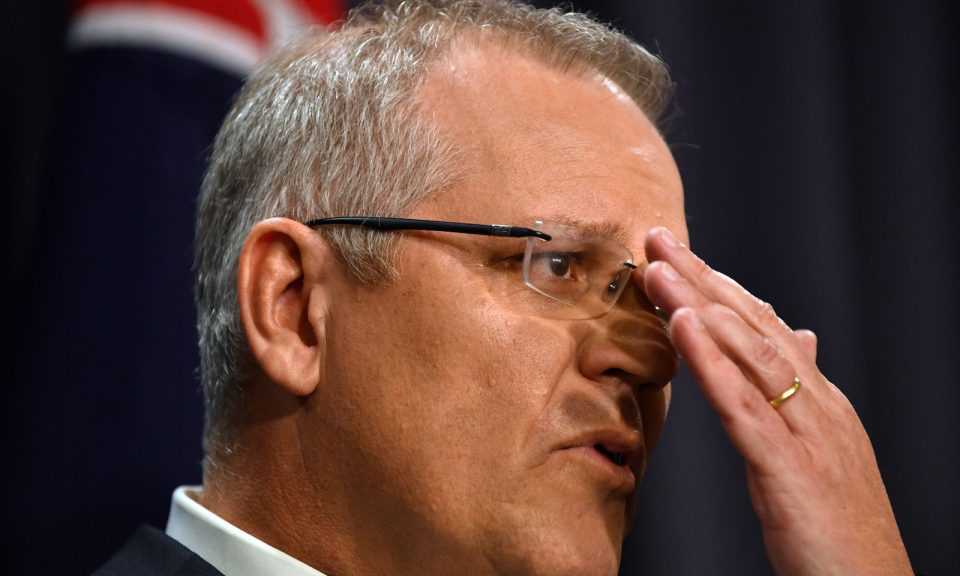Weak hand at helm as Australia drifts upon stormy regional seas
09 September, 2018

Australia faces arguably its greatest series of regional foreign policy challenges in decades – including, most notably, how to balance its relations with a rising China – but political turmoil is hampering a coherent and committed response.
New Australian Prime Minister Scott Morrison recently visited Indonesia to ink a new trade deal, while Foreign Minister Marise Payne was in Nauru for the Pacific Islands Forum.
Both politicians had been in their jobs for less than a week when making the trips. Both are part of a government that is clearly more focused on domestic political survival than international diplomacy.
Limited vision, political uncertainties
Not only is Morrison Australia’s fifth prime minister in ten years, but Marise Payne assumes the foreign minister role after replacing the long-serving and respected Julie Bishop, who had served in the position since 2013.
The loss of Bishop’s significant international standing and credibility was one of the casualties of the bruising parliamentary coup which brought down Prime Minister Malcolm Turnbull in August and attempted to install his Liberal Party’s ultra-conservative Home Affairs Minister Peter Dutton as premier, only to be outmaneuvered by Morrison.
These changes in senior personnel are only part of the policy problem, however. With new elections due in 2019 and the Morrison government seemingly on life support, Australia’s foreign policy is adrift without direction until the electorate delivers a fresh mandate.
The most likely electoral outcome is a victory for the opposition Labor Party, a prospect which undermines the current legitimacy of the Morrison government and makes any foreign policy move he makes uncertain and possibly temporary given his administration’s tenuous grip on power.
Conflicted in the Pacific
In the Pacific, for example, Payne has just signed a statement declaring that climate change is the “single biggest threat” to the region, even though the Liberal Party-led government she serves is being ripped apart by an internal struggle on the issue within its own ranks.
If last month’s parliamentary coup had had a different outcome, one of the Liberal Party’s climate change skeptics, Peter Dutton, would now be Australia’s prime minister. Dutton is well remembered for being caught off microphone in 2015 making jokes about the impact of rising sea levels in the region.
Australia’s efforts to assert any leadership in the Pacific are also compromised by its controversial A$5 billion (US$3.6 billion) offshore detention programs on Nauru – which hosted the recent forum meeting that discussed climate change – and in Papua New Guinea on Manus Island.
Combine all this with recent huge slashes to its foreign aid budget for the Pacific – traditionally the region’s top source of international assistance – and Australia’s influence in the neighborhood is equivocal at best, ethically questionable at worst.
Incoherence on China
While the Pacific is important, Australia’s most critical foreign policy challenge is managing its relations with China, including Beijing’s new thrust into the Pacific. It is here that Australia’s revolving leadership arguably leaves the nation most exposed.
US President Donald Trump’s regional policy, beyond his trade war with China, is to make allies such as Australia do more heavy lifting on regional security. But Australia’s domestic political issues mean that it is currently incapable of adequately filling the vacuum left by the US.
Trump’s policy vision is for Australia to reach out to countries such as Japan, Indonesia, Malaysia, Singapore and India to create a collaborative alliance that counterbalances China’s rising influence, manifested not only militarily in the South China Sea but also in Belt and Road initiatives in countries such as Laos, Cambodia and the Pacific island state of Vanuatu.
In Cambodia, Australian policy is compromised by its 2014 refugee resettlement deal with Prime Minister Hun Sen’s authoritarian government, an agreement which dominates Canberra’s policy towards the nation. The deal has arguably softened Canberra’s response to corruption involving politically influential Cambodians with asset holdings in Australia, and incidents such as the recent show trial and jailing on espionage charges of Australian film maker James Ricketson.
An Australian Navy band plays national anthems on the Australian Navy ship HMAS Adelaide in Sydney, December 19, 2016. Photo: Reuters/Jason Reed
Despite talk about Australian foreign policy needing a “Plan B” to deal with Trump’s shift in America’s priorities, there is little evidence of any significant or coherent action beyond a series of gestures to offend China.
Turnbull’s government’s decisions to enact punitive foreign influence laws aimed at China, and to bar Chinese technology companies Huawei and ZTE from tendering on Australia’s 5G network on national security grounds have been one-off moves which have only served to annoy its largest trading partner.
Collaborating with other regional nations on security matters does not need to spark a confrontation with China. If properly executed, it can create regional balance and respect which is good for overall stability.
There are few current signs, however, that Australia is capable of transcending its domestic political squabbling to strike this increasingly crucial foreign policy balance.
TAG(s):
